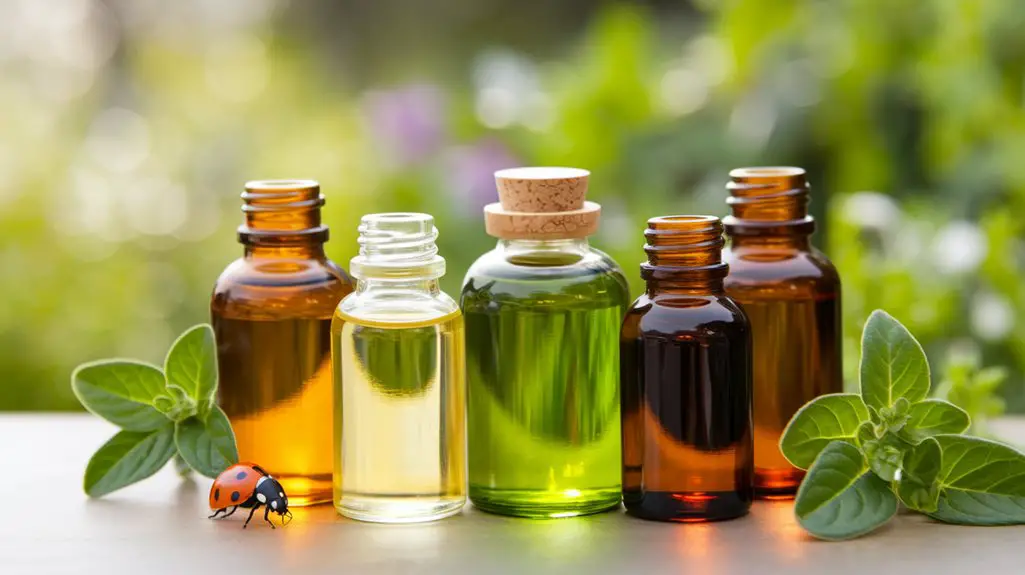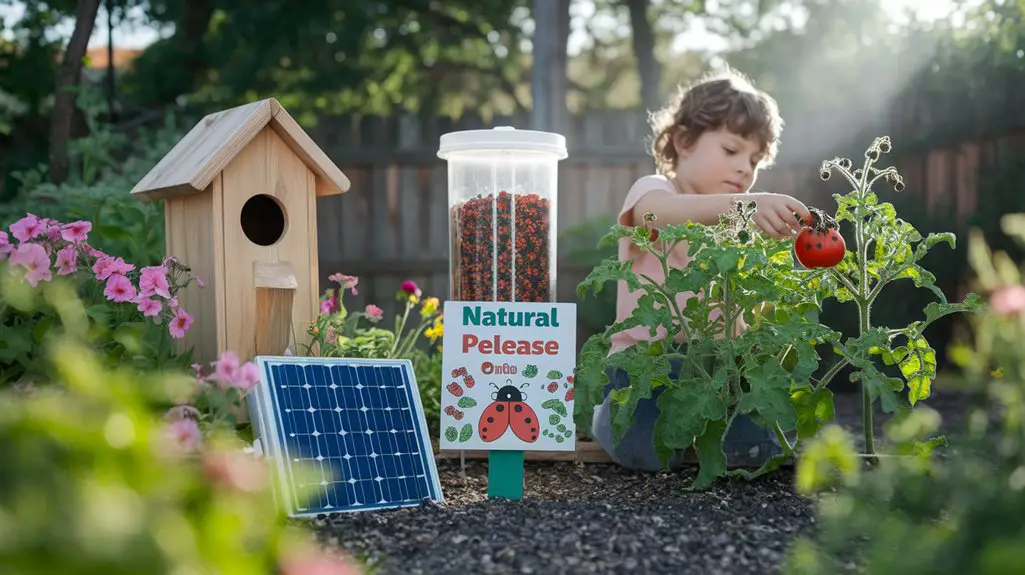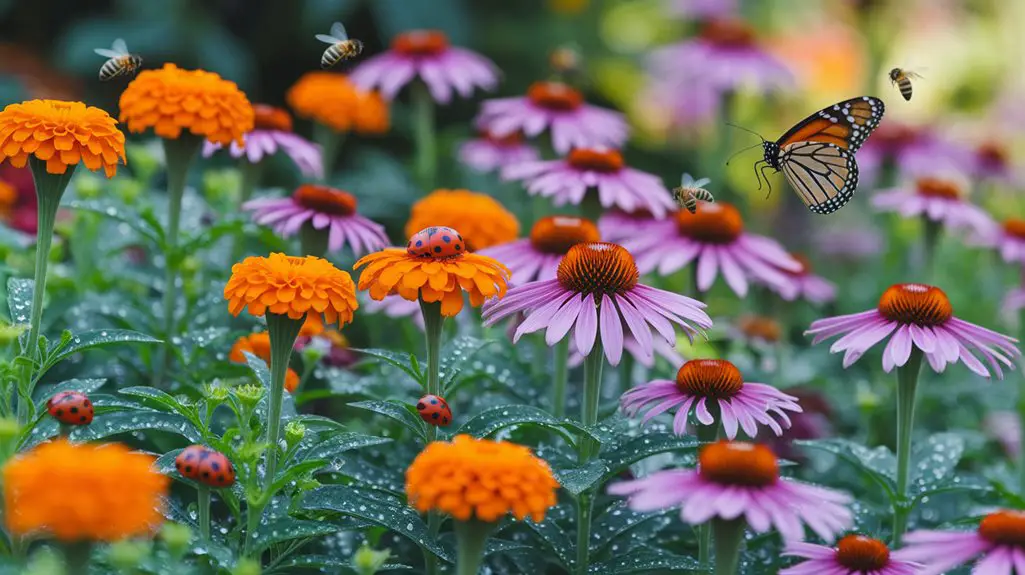Most commercial pesticides contain neonicotinoids that harm beneficial pollinators while targeting pests in your garden. You’re likely searching for effective alternatives that won’t compromise your garden’s ecosystem or your family’s health. Natural plant oils offer a powerful solution, combining potent pest-repelling properties with environmental safety. From disrupting insect life cycles to confusing their nervous systems, these five essential oils provide targeted protection while keeping your garden’s delicate balance intact.
Neem Oil: The Multi-Purpose Garden Guardian
When it comes to natural pest control, neem oil stands as the undisputed champion among garden defenders. Extracted from the seeds of the neem tree, this powerful botanical contains azadirachtin, a compound that disrupts the feeding and reproductive cycles of over 200 insect species.
You’ll find neem oil particularly effective against aphids, mealybugs, spider mites, and whiteflies. It works by suffocating insects and preventing larvae from maturing properly.
Unlike harsh chemicals, neem won’t harm beneficial insects once dried.
To use neem oil, mix 2 teaspoons with 1 teaspoon of mild liquid soap and 1 quart of water. Spray your plants in the evening to avoid leaf burn and repeat weekly.
For best results, coat both sides of leaves where pests hide and breed.
Peppermint Oil for Ant and Spider Control
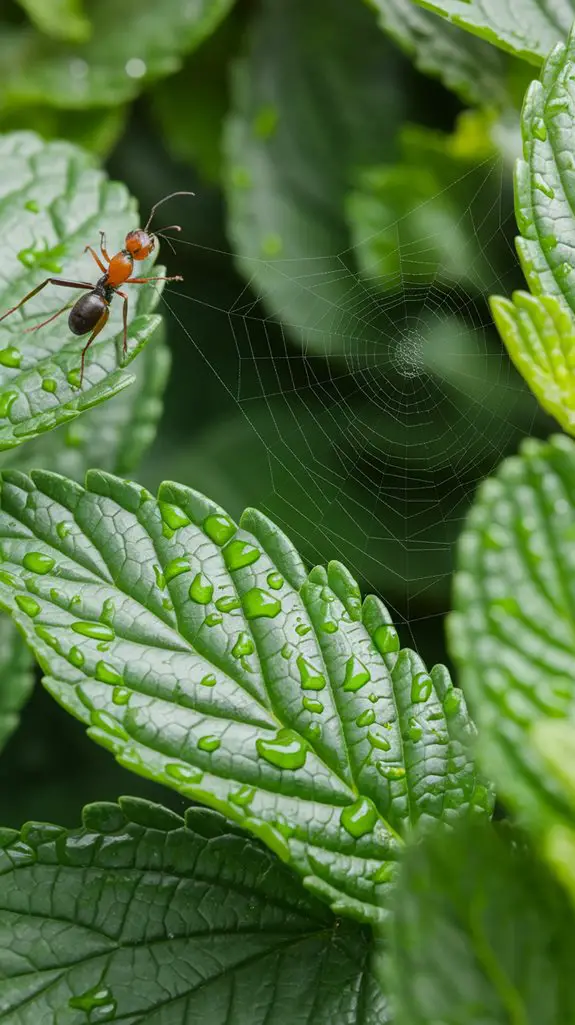
Peppermint oil offers a revitalizing solution to your ant and spider problems while filling your garden with an invigorating scent. This potent essential oil contains menthol, which disrupts insects’ neurotransmitters and overwhelms their sensitive olfactory systems.
To create an effective spray, mix 10-15 drops of peppermint oil with one cup of water and a teaspoon of dish soap. Apply this mixture directly to entry points, garden borders, and areas where pests congregate.
For indoor protection, soak cotton balls in undiluted oil and place them strategically near windowsills and doorways.
Unlike chemical pesticides, peppermint oil won’t harm beneficial insects like bees and butterflies when used properly. Reapply after rainfall or every 3-4 days for maximum effectiveness.
You’ll enjoy a fresher garden while keeping invasive pests at bay.
Citronella Oil to Repel Flying Insects
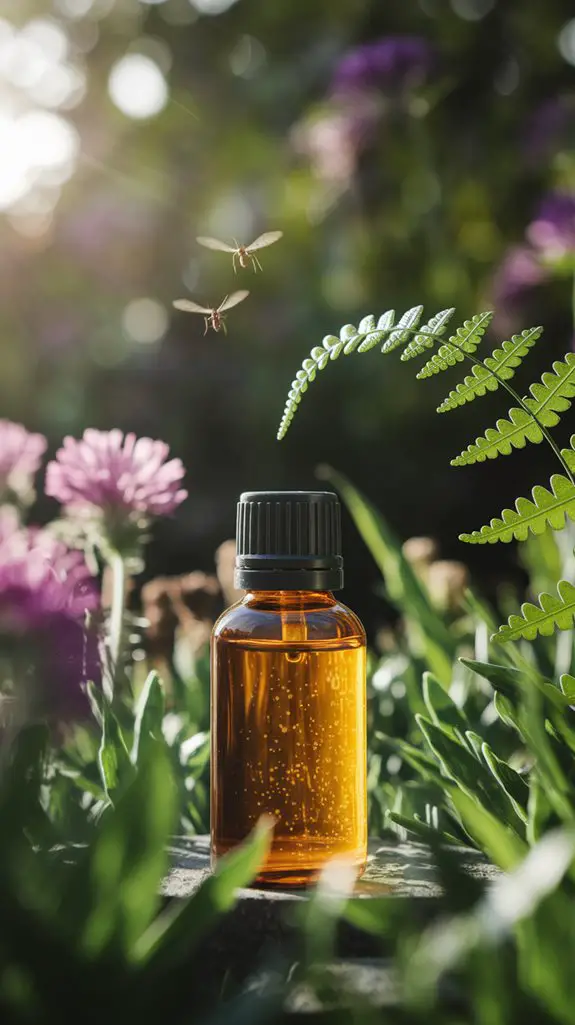
While peppermint oil tackles crawling invaders, citronella oil stands as the premier natural defense against flying insects that disrupt your outdoor sanctuary.
Extracted from lemongrass varieties, this powerful essential oil contains compounds that mask the carbon dioxide and lactic acid scents that attract mosquitoes and flies to humans. Additionally, using natural oils as pest deterrents can significantly reduce the need for chemical pesticides in your garden.
To implement citronella protection, mix 15-20 drops with a cup of water in a spray bottle, adding a teaspoon of witch hazel to help the oil disperse.
Apply this solution to garden borders, outdoor furniture, and as a personal repellent. You’ll need to reapply every few hours for continuous protection.
For enhanced effectiveness, combine citronella with lemon eucalyptus oil, which contains PMD, a CDC-recognized repellent that extends protection time considerably.
Rosemary Oil for Vegetable Garden Protection
With its potent aromatic compounds, rosemary oil serves as a formidable deterrent against common vegetable garden destroyers like cabbage loopers, aphids, and carrot flies. You’ll find this essential oil particularly effective when diluted with water at a 1:10 ratio and applied weekly to your vegetable beds.
| Pest | Vegetables Protected | Application Method | Effectiveness |
|---|---|---|---|
| Aphids | Lettuce, kale, peas | Foliar spray | High |
| Cabbage loopers | Broccoli, cabbage, cauliflower | Perimeter treatment | Moderate-high |
| Carrot flies | Carrots, parsnips | Soil drench | Moderate |
| Spider mites | Tomatoes, cucumbers | Preventative spray | High |
For maximum protection, supplement your spray with rosemary companion plants near vulnerable crops. The oil’s monoterpenes disrupt pests’ nervous systems while remaining food-safe when properly diluted. Additionally, using rosemary oil in your garden aligns with eco-friendly pest control solutions that promote a healthier ecosystem.
Eucalyptus Oil as a Natural Slug Deterrent
Eucalyptus oil offers garden enthusiasts a powerful weapon against one of the most persistent garden pests—slugs and snails.
This potent essential oil contains compounds that these mollusks find intensely repulsive, making it an effective barrier around vulnerable plants.
To create a slug deterrent, mix 20 drops of eucalyptus oil with one cup of water and a teaspoon of biodegradable dish soap in a spray bottle.
Apply this solution directly to the soil surrounding your plants, reapplying after rainfall. You can also soak cotton balls in undiluted eucalyptus oil and place them strategically throughout your garden beds.
For best results, combine this treatment with other slug management practices like removing debris and watering in the morning.
Unlike chemical pesticides, eucalyptus oil won’t harm beneficial insects or contaminate your edible plants.
Conclusion
You’ll find these five oils can transform your garden from a pest paradise to a thriving oasis. With neem oil disrupting insect reproduction, peppermint confusing ants, citronella repelling airborne invaders, rosemary shielding vegetables, and eucalyptus deterring slugs, you’re armed with nature’s most potent defenders. Start incorporating these solutions today—they work a million times better than toxic chemicals and provide effective, sustainable protection your plants and pollinators will appreciate.

